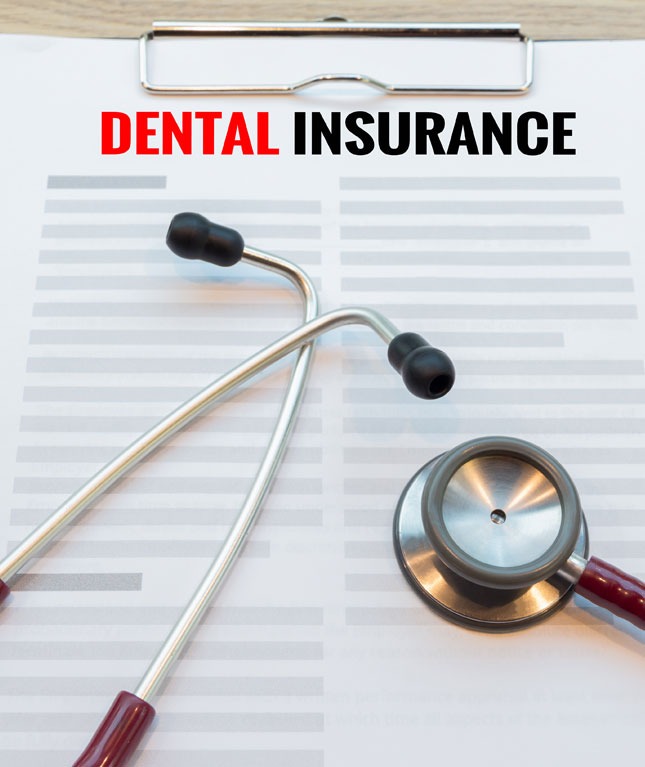Insurance

Insurance
Victorian Dental accepts most P.P.O. insurance plans. We do not currently accept H.M.O. or Medicare/Medicaid programs. Dental insurance plans vary, and you should review all the benefits your plan offers. This can significantly affect the plan’s coverage and your out-of-pocket expenses.
P.P.O. (Preferred Provider Organization) programs usually allow patients to go to the dentist of their choice. These plans pay a percentage of the dentist’s contracted rate or “reasonable” or “customary” fee limit. These limits are the result of a contract between the plan purchaser and the insurance carrier.
Predetermination of Costs
Some dental insurance plans encourage you, or your dentist to submit a treatment proposal to the plan administrator before receiving treatment.
After review, the plan administrator will determine: the patient’s eligibility; the eligibility period; services covered; the patient’s required co-payment or out of pocket expense; and the maximum limitation.
Some plans require predetermination for treatments exceeding a specified dollar amount. This process is also known as Pre-Authorization, Pre-Certification, Pre-Treatment Estimate, or Prior Authorization.


Annual Benefits Limitations
To help contain costs, your dental insurance plan may limit benefits by the number of procedures, and/or dollar amount in a given year. In most cases, particularly if you’ve been getting regular preventive care, these limitations allow for adequate coverage.
By knowing in advance what, and how much the plan allows, you and your dentist can plan treatments that will minimize your out-of-pocket expenses while maximizing compensation offered by your benefits plan.
In reviewing and comparing dental insurance plans, consider the following when determining whether the coverage will satisfy your dental care needs:
- Does the plan give you the freedom to choose your own dentist or are you restricted to a panel of dentists selected by the insurance company? If restricted to a panel, is your dentist on this panel?
- Who controls treatment decisions?
- Does the plan cover diagnostic, preventive, and emergency services?
- What routine treatment is covered by the plan?
- What major dental care is covered by the plan?
- What percentage of these costs will you have to pay?
- What are the plan's limitations and exclusions?
- Will the plan allow referrals to dental specialists?
- Can you see the dentist whenever you need to and schedule appointment times convenient for you?
- Who is eligible for coverage under the plan and when does it go into effect?
- Will this plan have any waiting periods?
Limitations of Dental Insurance Plans
To control costs, most dental insurance plans limit the amount of care you can receive in a given year. This is done by placing a dollar “cap” or limit on the amount of benefits you can receive.
They may also restrict the number, or type of services that are covered. Some plans may totally exclude specific services, or treatment to lower costs. Know specifically what services the plan covers, and excludes.
There are however, certain limitations and exclusions in most dental insurance plans that are designed to keep dentistry’s costs down without penalizing the patient. All plans exclude experimental procedures and services not performed by or under the supervision of a dentist.
Some plans may have less obvious exclusions. Sometimes dental coverage and medical health insurance may overlap. Read and understand the conditions of your dental insurance plan. Exclusions in your dental plan may be covered by your medical insurance.
Things to Consider About Dental Insurance
Patients and dental insurance plan purchasers should insist on regular reviews of their premium levels to ensure that our U.C.R. is equitable to the patients fee schedule. This analysis can help optimize your benefit levels, ensuring that every dollar you spend is used wisely.
If you are covered under two dental benefit plans, notify the administrator or carrier of your primary plan about your dual coverage status. Insurance plan benefit coordination can help protect your rights, and maximize your entitled benefits.
In some cases you may be granted full coverage where plan benefits overlap, and receive a benefit from one plan where the other plan lists an exclusion.
It may be wise to choose a plan that imposes dollar or service limitations, rather than one that excludes categories of service. By doing so, you can receive the care that is best for you, and actively participate with your dentist in the development of treatment plans that give the highest quality care.
To help stretch each dental insurance dollar, most plans provide patients and purchasers with special administrative services. Find out if your plan provides the following mechanisms to help you budget, analyze, and dispute, if necessary, the costs of your dental care.
